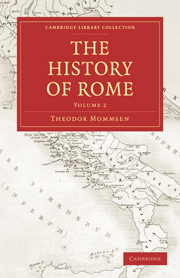Book contents
- Frontmatter
- Contents
- MAP OF ITALY
- BOOK THIRD: FROM THE UNION OF ITALY TO THE SUBJUGATION OF CARTHAGE AND OF THE GREEK STATES
- CHAPTER I CARTHAGE
- CHAPTER II THE WAR BETWEEN ROME AND CARTHAGE CONCERNING SICILY
- CHAPTER III THE EXTENSION OF ITALY TO ITS NATURAL BOUNDARIES
- CHAPTER IV HAMILCAR AND HANNIBAL
- CHAPTER V THE WAR UNDER HANNIBAL TO THE BATTLE OF CANNÆ
- CHAPTER VI THE WAR UNDER HANNIBAL FROM CANNÆ TO ZAMA
- CHAPTER VII THE WEST FROM THE PEACE OF HANNIBAL TO THE CLOSE OF THE THIRD PERIOD
- CHAPTER VIII THE EASTERN NATIONS AND THE SECOND MACEDONIAN WAR
- CHAPTER IX THE WAR WITH ANTIOCHUS OF ASIA
- CHAPTER X THE THIRD MACEDONIAN WAR
- CHAPTER XI THE GOVERNMENT AND THE GOVERNED
- CHAPTER XII THE MANAGEMENT OF LAND AND OF CAPITAL
- CHAPTER XIII FAITH AND MANNERS
- CHAPTER XIV LITERATURE AND ART
- CORRECTIONS
CHAPTER II - THE WAR BETWEEN ROME AND CARTHAGE CONCERNING SICILY
Published online by Cambridge University Press: 05 October 2010
- Frontmatter
- Contents
- MAP OF ITALY
- BOOK THIRD: FROM THE UNION OF ITALY TO THE SUBJUGATION OF CARTHAGE AND OF THE GREEK STATES
- CHAPTER I CARTHAGE
- CHAPTER II THE WAR BETWEEN ROME AND CARTHAGE CONCERNING SICILY
- CHAPTER III THE EXTENSION OF ITALY TO ITS NATURAL BOUNDARIES
- CHAPTER IV HAMILCAR AND HANNIBAL
- CHAPTER V THE WAR UNDER HANNIBAL TO THE BATTLE OF CANNÆ
- CHAPTER VI THE WAR UNDER HANNIBAL FROM CANNÆ TO ZAMA
- CHAPTER VII THE WEST FROM THE PEACE OF HANNIBAL TO THE CLOSE OF THE THIRD PERIOD
- CHAPTER VIII THE EASTERN NATIONS AND THE SECOND MACEDONIAN WAR
- CHAPTER IX THE WAR WITH ANTIOCHUS OF ASIA
- CHAPTER X THE THIRD MACEDONIAN WAR
- CHAPTER XI THE GOVERNMENT AND THE GOVERNED
- CHAPTER XII THE MANAGEMENT OF LAND AND OF CAPITAL
- CHAPTER XIII FAITH AND MANNERS
- CHAPTER XIV LITERATURE AND ART
- CORRECTIONS
Summary
State of Sicily
Campanian mercenaries
For upwards of a century the feud between the Carthaginians and the rulers of Syracuse had devastated the beautiful island of Sicily. On both sides the contest was carried on with the weapons of political proselytism, for, while Carthage kept up communications with the aristocraticorepublican opposition in Syracuse, the Syracusan dynasts maintained relations with the national party in the Greek cities that had become tributary to Carthage. On both sides armies of mercenaries were employed to fight their battles—by Timoleon and Agathocles, as well as by the Phoenician generals. And as like means were employed on both sides, so the conflict had been waged on both with a disregard of honour and a perfidy unexampled in the history of the west. The Syracusans were the weaker party. In the peace of 440, Carthage had still limited her claims to the third of the island to the west of Heraclea Minoa and Himera, and had expressly recognized the hegemony of the Syracusans over all the cities to the eastward. The expulsion of Pyrrhus from Sicily and Italy (479) left by far the larger half of the island, and especially the important city of Agrigentum, in the hands of Carthage; the Syraeusans retained nothing but Tauromenium and the south-east of the island. In the second great city on the east coast, Messana, a band of foreign soldiers had established themselves and held the city, independent alike of Syracusans and Carthaginians. These new rulers of Messana were Campanian mer cenaries.
- Type
- Chapter
- Information
- The History of Rome , pp. 28 - 61Publisher: Cambridge University PressPrint publication year: 2010First published in: 1862



